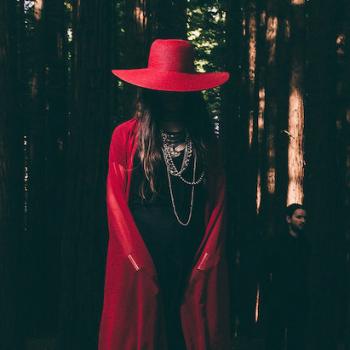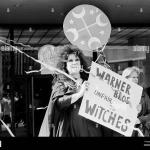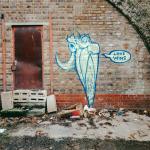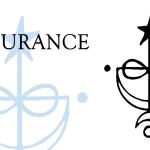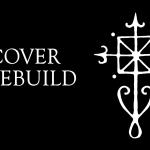(I’ve always been fascinated by the occult overtones of Rock and Roll and Heavy Metal. Generally, the occult trappings in rock are nothing more than window dressing, but they can still be worth exploring. Strange Days is a series chronicling the truth about the occult in rock. Future articles will include looks at The Doors and T. Rex)
Without question, Black Sabbath is one of the all-time great rock bands. They sit on the classic rock Rushmore, alongside bands like Led Zeppelin, Pink Floyd, and The Who. The biggest difference between Black Sabbath and those bands is that Sabbath invented a sub-genre of music almost entirely on their own: Heavy Metal. The Sabs were the first ever heavy metal band, and there’s very little debate about it.
Sabbath guitar player Tony Iommi almost single handedly created the genre when he was forced to start “down-tuning” his guitar after an industrial accident chopped off the tips of the fingers on his left hand. That horrible accident changed the sound of Iommi’s guitar, making it deeper, darker, and kind of menacing. (For those of you who don’t play guitar, I should probably elaborate a little bit. Iommi uses his right hand on the frets of his guitar. It’s that hand that he uses to press down the strings. Down-tuning makes the strings lighter, and therefore easier to press down.) That was the first part of the equation that would create heavy metal, the second part was the band’s aura, an aura created almost entirely out of the public’s perception that Black Sabbath was a Satanic rock band.
The song Black Sabbath by Coven
There are a lot of people out there who think that Sabbath was the first in a long line of bands influenced by Lucifer. The truth of it is that Sabbath came to Satan’s table kind of late, and they only came to it grudgingly. There had been a couple of major label bands before Sabbath that very publicly embraced the Devil. The first was “Coven,” a band with its roots firmly in that hotbed of Satanic activity that was the American Midwest. Their first album, Witchcraft Destroys Minds and Reaps Souls, sounded like middle of the road 1969-hippy music, but the band looked like agents of the dark one on the cover, clad mostly in black standing next to a skull. The album even featured a recording of a “Satanic Black Mass” on side two. Despite being released by a mainstream record label, the album was quickly forgotten, though the band did initially attract a lot of media attention.
http://www.youtube.com/watch?v=2rEOqCNgqEQ&feature=related
If you want a good laugh and enjoy hearing people yell “Kiss the Goat,” Coven’s Black Mass is worth a listen.
The second rock band to openly embrace the occult, was the English Black Widow (yes, you guessed it, people confused them a lot with Black Sabbath back in 1970). While Black Widow sounded more like Jethro Tull than Black Sabbath, they were often confused for a heavy metal band, saxophone solos be damned! Black Widow scored a minor hit in Great Britain with Come to the Sabbat (which I kind of like) off of their debut record Sacrifice. Black Widow played the Satan stuff up to the hilt, even going so far as to conduct black masses between songs at concerts. (Some of those black masses featured English Witches Alex and Maxine Sanders, yay?) Lyrically, the songs have almost a Pagany vibe, that is before the choruses kick in calling for Lucifer.
http://www.youtube.com/watch?v=Wsr4nGdb1mg&feature=related
Join Black Widow at the sabbat!
While Black Sabbath would cultivate a rather sinister image, much of that was unwarranted. Certainly the name “Black Sabbath” is not a beacon of light, but it certainly wasn’t meant to be an ode to a black mass. Black Sabbath was a compromise name, as the band was originally named (the very hippy sounding) Earth. The only problem was that there was another band in England already named Earth, so they ended up having to change the name.
There’s a bit of controversy over where the name Black Sabbath actually came from. There are some claims that the band was named after the movie Black Sabbath starring Boris Karloff, and there was also a book by the same name from the pen of horror writer Dennis Wheatley. Bass player Geezer Butler was certainly a fan of Wheatley’s so it’s quite possible that the name came from there. As early as 1969, “Earth” was also playing a tune called Black Sabbath, another possible source for the band name. It’s not unreasonable to suggest that all three factors played a part in Earth becoming Black Sabbath.
While the first Black Sabbath album (imaginatively named Black Sabbath) doesn’t endorse Satan, record label Warner Brothers tried to make it seem as if the band did. An early record release party held in Los Angeles (minus the band in attendance) featured an appearance by Satanist Anton LaVey, which dogged the band for years. The British release of the album (courtesy of Vertigo Records) featured an upside down cross on the inside record sleeve. (The band often sported crosses in photos and on-stage, but they were always right side up. Early versions were made by Ozzy’s dad.) Such flourishes, made without the band’s consent or permission, did more to perpetuate the idea that the band was “Satanic” than anything on the album musically.
The album was certainly influenced by the occult, and Geezer Butler and Tony Iommi have admitted to being interested in such things during the band’s early days. Iommi has said that there was “a lot of interest, not practice, but interest.” Most of the interest was confined to Butler, who according to Iommi “would do stuff like that, have all his candles burning. Black Walls. He would live the part. We used to go around the black magic shops as well.” Such things certainly weren’t typical in England circa 1969, but they weren’t completely out of place.
Humorously enough it was Ozzy Osbourne (lead singer) who would get saddled with the most amount of Satanic garbage over the years. The singer was never into the occult like Butler, and has been quoted as saying “the only time I’ve ever been into black magic has been while eating a box of chocolates.” Certainly the “Prince of Darkness” shtick has served Osbourne well over the years, but the occult was never his forte.
Ozzy’s greatest contribution to the band on their first album, aside from his vocals, might have been the lyrics he crafted to the song Black Sabbath, one of only three times Osbourne actually wrote lyrics while in Sabbath. Though the tune is certainly creepy, and rather chilling, it was an ode against dabbling in the occult, not an endorsement. Ozzy’s lyrics, with lines like “please God help me” came about due to an episode Butler had with a sinister presence.
http://www.youtube.com/watch?v=akt3awj_Ah8
This video just kicks ass, yay Sabbath!
According to Butler: ““Ozzy brought me this really old black magic book, and it was all in Latin and Greek or whatever. Somebody had lent it to him, and he knew that I was interested in all that stuff. I was looking through it, and then I hid it in a cupboard, where I was living. Because I just got a weird feeling from it. And the next day I went to get it out from the cupboard, to reread it, and it had disappeared. Completely gone into thin air, and it was just me living there at the time. And then, I was lying in bed one night and I just felt this presence. I woke up and I saw this black shape, standing at the bottom of me bed staring at me, and it just totally freaked me out. This was like 1969. I told Ozzy about it, and that was when I went off black magick. I took it as a warning to get out while I can.”
While Geezer might have been looking to get out in 1969, the first album does contain a tune written from the Devil’s point of view. According to Butler (primary lyricist for the band) N.I.B.* was originally written to be a humorous song about Satan falling in love with a mortal woman, but somewhere along the line the humor got lost somewhere. That’s not to say the song is an evil one, it’s a rocking one, but lines like “I will give you those things you thought unreal. The sun, the moon, the stars all bear my seal” certainly conjure up dark vistas. Osbourne’s cry of “My name is Lucifer please take my hand” probably helped to inspire a cadre of young Satanists who didn’t take his warning in the song Black Sabbath seriously. N.I.B.; named after drummer Bill Ward’s face looking like the “nib” of a pen, was about as dark as Sabbath ever got, and as far as darkness goes, it was pretty lukewarm.
http://www.youtube.com/watch?v=TOXPSSZkFD0&feature=related
Now I have you with me under my power . . . . .
By the time Sabbath’s second album, Paranoid, rolled out in the fall of 1970 the band was already desperately trying to get away from their Satanic and occult tinged image. One of the early standout tracks on the album, Walpurgis, had all of its original lyrics thrown out and was then turned into the colossal War Pigs. The lyrics to Walpurgis told the story of a group of witches making sacrifices to Satan. Lyrics like “Carry banners that denounce the Lord” and “On the hill the church in ruin is the scene of evil doings” would have been at home next to Black Sabbath and N.I.B., but the band wanted to break out of that mold, so Butler changed his Satanic ode into the anti-war masterpiece War Pigs. The only occult like nod in War Pigs was the comparison of Vietnam War-era generals to “witches at black masses,” and the line “Satan laughing spreads his wings.” (Oddly, Walpurgis is only available on an Ozzy best of compilation, strange because he had so very little to do with the song.)
http://www.youtube.com/watch?v=IIPlSVN1hk4
The Walpurgis version of War Pigs.
Like most bands that write about the occult early in their career, Sabbath moved away from that initial inspiration (or in Ozzy’s case, fear) and found other things to write about. Science fiction and fantasy were certainly inspiration, drugs another. Even sinister sounding songs like Children of the Grave ended up being about love. While the occult would long be associated with the band, the first incarnation of Sabbath moved quickly away from it, and by 1971 had penned a tune for the album Master of Reality that would have been at home on most Christian rock records.
Yes, you read that last sentence right, Sabbath moved so far away from the occult that they were actually endorsing Christianity just two short years after N.I.B. After Forever was all about accepting Christ and saving one’s soul. Butler’s last verse in After Forever really does lay the cards out on the table when it comes to Black Sabbath and the occult: “Perhaps you’ll think before you say that God is dead and gone. Open your eyes, just realize that he’s the one. The only one who can save you now from all this sin and hate. Or will you still jeer at all you hear? Yes – I think it’s too late.”
http://www.youtube.com/watch?v=fkmyZ8juZWw
Hail Jesus!
While the first lineup of Black Sabbath would go on to release five more albums after Master of Reality (a few of them classics), none would ever be as popular as the first three records. The occult overtones mostly died out as well, even if the media and their record label still liked to portray the band in that light. (The cover to the album Sabbath Bloody Sabbath features demons hovering over the bed of a dying man.) After the dissolution of the original band, Iommi would find the occult again, but only in order to sell more records as he tried to steer the band in the direction many in the public expected it to go. Some of the post-Ozzy Sabbath albums are classics too, especially the stuff with Ronnie James Dio, but the chills created by songs like Black Sabbath became a thing of the past.
Ozzy tried extremely hard to replicate the menacing atmosphere of Sabbath’s early days, and succeeded early in his career. Songs like Mr. Crowley (about who else? Aleister Crowley) shocked parents and tantalized teens who dreamed of dabbling with the occult, but Ozzy was never an occultist, and while the trappings helped to sell albums, it was obvious in interviews that he was never into the lifestyle. The lyrics to songs like Crowley were written by bass player Bob Daisley.
While the guys in Black Sabbath were never occultists, nor did they worship the Devil, they did help to create the perception that good heavy metal bands did do those things. In doing so, they defined metal as a genre against authority, which it remains nearly forty years later.
(All quotes in this article are from Martin Popoff’s book Black Sabbath: Doom Let Loose.)
*N.I.B. is sometimes referred to as Nativity in Black, a title popularized by Ronnie James Dio when he was singing in the band.
http://www.youtube.com/watch?v=EZojHIL1fHo
The Dio version of N.I.B. is equally awesome.







